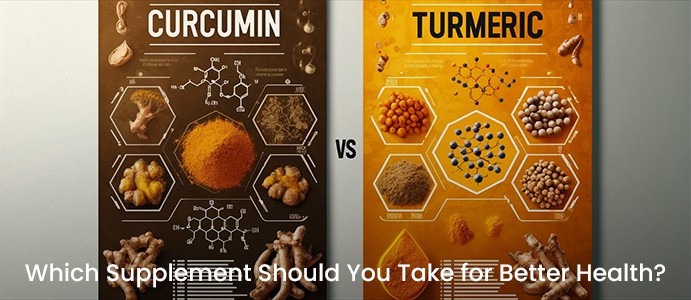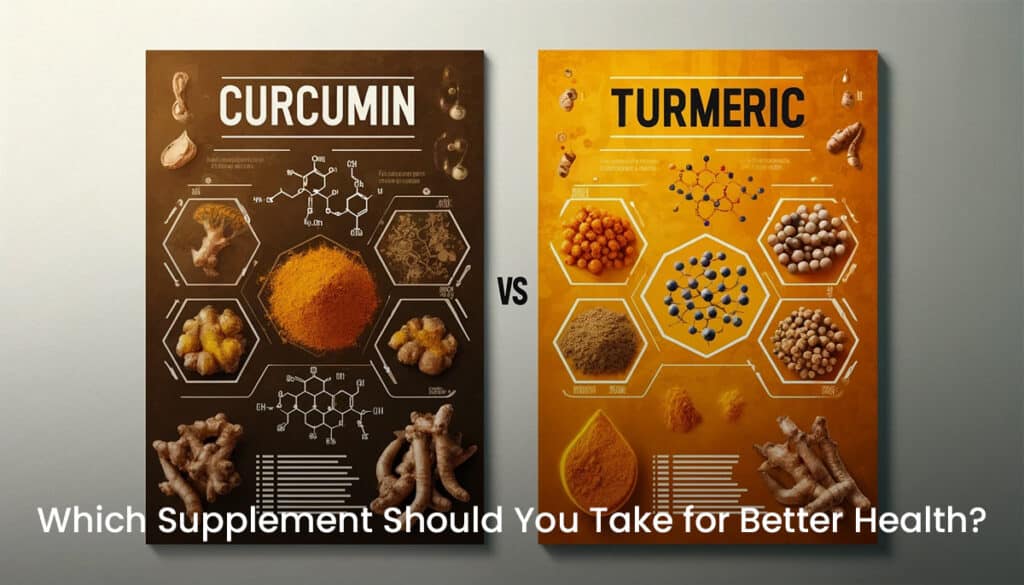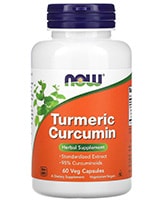

Turmeric and curcumin are staples in the spice cabinet and increasingly, in the medicine cabinet. Understanding the differences between these two can play a crucial role in how they benefit your health. This article explores turmeric and curcumin, their health benefits, and guidance on choosing the right supplement for your health needs.
What are Turmeric and Curcumin?
Turmeric is derived from the root of the Curcuma longa plant, native to Asia and Central America. Known for its bright yellow colour, turmeric is not just a key ingredient in culinary dishes but also traditional medicines across various cultures. Curcumin is the most active compound found in turmeric[1]Sharifi-Rad, J., Rayess, Y. E., Rizk, A. A., Sadaka, C., Zgheib, R., Zam, W., Sestito, S., Rapposelli, S., Neffe-Skocińska, K., Zielińska, D., Salehi, B., Setzer, W. N., Dosoky, N. S., Taheri, Y., Beyrouthy, M. E., Martorell, M., Ostrander, E. A., Rasul Suleria, H. A., Cho, W. C., … Martins, N. (2020). Turmeric and Its Major Compound Curcumin on Health: Bioactive Effects and Safety Profiles for Food, Pharmaceutical, Biotechnological and Medicinal Applications. Frontiers in Pharmacology, 11. https://doi.org/10.3389/fphar.2020.01021, constituting about 2-8% of the spice. It’s primarily responsible for turmeric’s vibrant colour and many of its health benefits.
Shared Health Benefits
Both turmeric and curcumin are celebrated for their potent anti-inflammatory and antioxidant properties[2]El-Saadony, M. T., Yang, T., Korma, S. A., Sitohy, M., Abd El-Mageed, T. A., Selim, S., Al Jaouni, S. K., Salem, H. M., Mahmmod, Y., Soliman, S. M., A. Mosa, W. F., El-Wafai, N. A., Abou-Aly, H. E., Sitohy, B., Abd El-Hack, M. E., El-Tarabily, K. A., & Saad, A. M. (2022). Impacts of turmeric and its principal bioactive curcumin on human health: Pharmaceutical, medicinal, and food applications: A comprehensive review. Frontiers in Nutrition, 9. https://doi.org/10.3389/fnut.2022.1040259. These compounds can significantly reduce markers of inflammation in the body, which is beneficial for treating conditions like osteoarthritis. Additionally, their antioxidant actions help reduce oxidative stress, which is linked to a variety of chronic diseases. Turmeric and curcumin also play a role in improving heart health[3]Cox, F. F., Misiou, A., Vierkant, A., Ale-Agha, N., Grandoch, M., Haendeler, J., & Altschmied, J. (2022). Protective Effects of Curcumin in Cardiovascular Diseases—Impact on Oxidative Stress and Mitochondria. Cells, 11(3). https://doi.org/10.3390/cells11030342 by managing cholesterol levels and enhancing blood vessel function. Moreover, they have been shown to improve blood sugar control, which can be incredibly beneficial for managing diabetes.
Distinguishing Between Turmeric and Curcumin
While turmeric contains curcumin, the concentration in natural turmeric is relatively low. Supplements may offer curcumin in higher concentrations, which is something to consider when targeting specific health issues. Understanding the differences in their composition and how they work in the body can help determine which supplement, turmeric or curcumin, might be more beneficial for your specific health needs.
Unique Benefits of Curcumin
Curcumin is renowned for its powerful anti-inflammatory properties, often compared favourably to over-the-counter anti-inflammatory drugs like ibuprofen. This makes it particularly effective in managing chronic inflammatory conditions such as rheumatoid arthritis and osteoarthritis[4]Kou, H., Huang, L., Jin, M., He, Q., Zhang, R., & Ma, J. (2023). Effect of curcumin on rheumatoid arthritis: A systematic review and meta-analysis. Frontiers in Immunology, 14. https://doi.org/10.3389/fimmu.2023.1121655. Beyond inflammation, curcumin has shown promise in enhancing brain function. Clinical studies suggest that it can improve symptoms of depression and anxiety by modulating biochemical pathways involved in mental health. Moreover, its potential neuroprotective properties could be significant in the prevention of neurodegenerative diseases like Alzheimer’s.
Unique Benefits of Turmeric
While curcumin is a standout compound, turmeric itself offers a broader range of medicinal benefits due to its complex mix of natural compounds. Turmeric has been used to enhance skin health, treat digestive issues, and even as a topical application for wound healing due to its antimicrobial properties[5]Adamczak, A., Ożarowski, M., & Karpiński, T. M. (2020). Curcumin, a Natural Antimicrobial Agent with Strain-Specific Activity. Pharmaceuticals, 13(7). https://doi.org/10.3390/ph13070153. Furthermore, turmeric may have protective properties against certain cancers, a benefit not solely attributable to curcumin. Its holistic use in traditional medicine underscores its potential as a versatile health supplement.
How to Choose the Right Supplement
Choosing between turmeric and curcumin supplements depends largely on your health objectives. For general wellness and broad anti-inflammatory benefits, whole turmeric may be adequate. However, if you are seeking more concentrated effects, particularly for joint pain or mental health, curcumin supplements might be more effective. It is also important to consider the bioavailability of curcumin, which is relatively low on its own. Many supplements include piperine, found in black pepper, which can enhance absorption significantly.
Safety and Considerations
While turmeric and curcumin supplements are generally safe, they can interact with certain medications, such as blood thinners and diabetes medication[6]Shaikh, J., Kumar, K., & Uttekar, P. S. (2022). Which Medications Should Not Be Taken With Turmeric? MedicineNet. Retrieved from https://www.medicinenet.com/which_medications_not_to_take_with_turmeric/article.htm. Therefore, it’s essential to consult with a healthcare provider before starting any new supplement regimen. Additionally, high doses or long-term use of curcumin may cause gastrointestinal upset in some individuals. Pregnant women and those with gallbladder disease are advised to avoid curcumin supplements.
Conclusion
In summary, both turmeric and curcumin offer substantial health benefits, each with unique properties that can support wellness in different ways. While turmeric provides a broad spectrum of benefits due to its complex composition of compounds, curcumin offers targeted relief from inflammation and has notable effects on brain health and chronic disease management. The choice between turmeric and curcumin supplements should be informed by specific health objectives and in consultation with healthcare professionals to ensure safety and efficacy.
Buy Turmeric Online Review Comparison Table
| Product | Company | Quantity | Price | Country | Website |
 Turmeric Curcumin | iHerb | 60 pills (665mg) | $18.25 |  Worldwide, AU | Visit Website >> |
References
| ↑1 | Sharifi-Rad, J., Rayess, Y. E., Rizk, A. A., Sadaka, C., Zgheib, R., Zam, W., Sestito, S., Rapposelli, S., Neffe-Skocińska, K., Zielińska, D., Salehi, B., Setzer, W. N., Dosoky, N. S., Taheri, Y., Beyrouthy, M. E., Martorell, M., Ostrander, E. A., Rasul Suleria, H. A., Cho, W. C., … Martins, N. (2020). Turmeric and Its Major Compound Curcumin on Health: Bioactive Effects and Safety Profiles for Food, Pharmaceutical, Biotechnological and Medicinal Applications. Frontiers in Pharmacology, 11. https://doi.org/10.3389/fphar.2020.01021 |
|---|---|
| ↑2 | El-Saadony, M. T., Yang, T., Korma, S. A., Sitohy, M., Abd El-Mageed, T. A., Selim, S., Al Jaouni, S. K., Salem, H. M., Mahmmod, Y., Soliman, S. M., A. Mosa, W. F., El-Wafai, N. A., Abou-Aly, H. E., Sitohy, B., Abd El-Hack, M. E., El-Tarabily, K. A., & Saad, A. M. (2022). Impacts of turmeric and its principal bioactive curcumin on human health: Pharmaceutical, medicinal, and food applications: A comprehensive review. Frontiers in Nutrition, 9. https://doi.org/10.3389/fnut.2022.1040259 |
| ↑3 | Cox, F. F., Misiou, A., Vierkant, A., Ale-Agha, N., Grandoch, M., Haendeler, J., & Altschmied, J. (2022). Protective Effects of Curcumin in Cardiovascular Diseases—Impact on Oxidative Stress and Mitochondria. Cells, 11(3). https://doi.org/10.3390/cells11030342 |
| ↑4 | Kou, H., Huang, L., Jin, M., He, Q., Zhang, R., & Ma, J. (2023). Effect of curcumin on rheumatoid arthritis: A systematic review and meta-analysis. Frontiers in Immunology, 14. https://doi.org/10.3389/fimmu.2023.1121655 |
| ↑5 | Adamczak, A., Ożarowski, M., & Karpiński, T. M. (2020). Curcumin, a Natural Antimicrobial Agent with Strain-Specific Activity. Pharmaceuticals, 13(7). https://doi.org/10.3390/ph13070153 |
| ↑6 | Shaikh, J., Kumar, K., & Uttekar, P. S. (2022). Which Medications Should Not Be Taken With Turmeric? MedicineNet. Retrieved from https://www.medicinenet.com/which_medications_not_to_take_with_turmeric/article.htm |

Leave a Reply